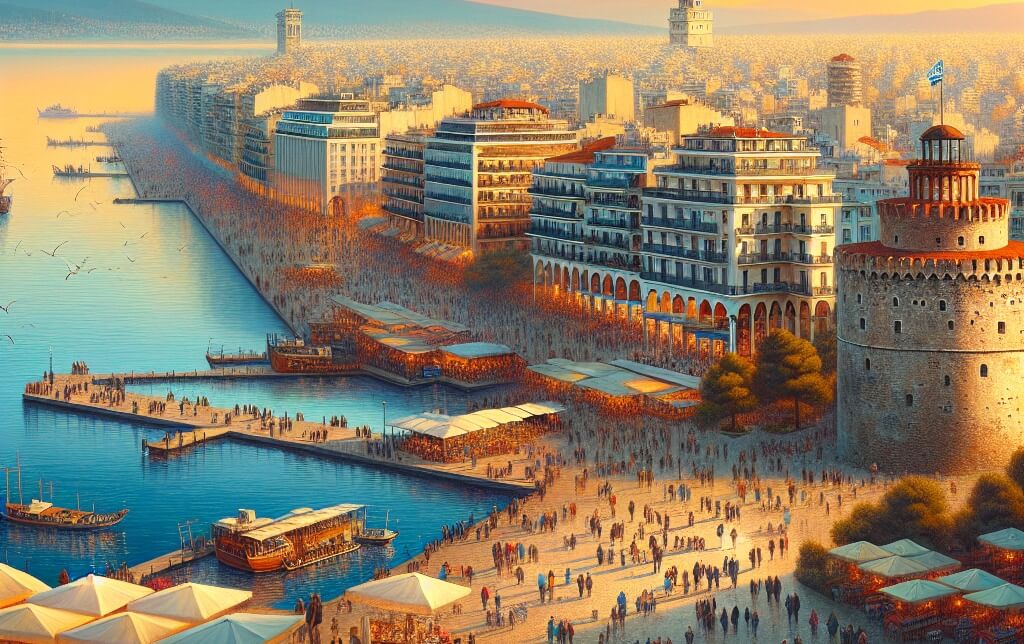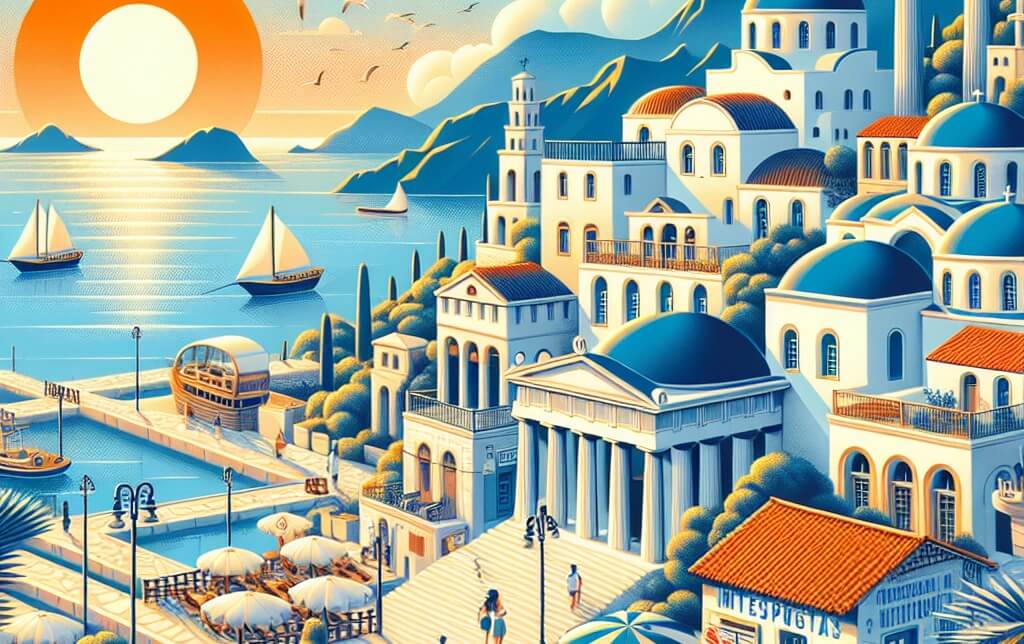
Discover the Charm of Greece: Explore Sparti Today
Embark on a captivating journey through the historical wonders of Greece by exploring the enchanting city of Sparti. Nestled in the heart of the Peloponnese region, Sparti beckons travelers with its rich tapestry of ancient ruins, cultural heritage, and scenic beauty. From the legendary site of ancient Sparta to the picturesque landscapes of the surrounding mountains, Sparti offers a compelling blend of history and natural splendor. Immerse yourself in the charm of this timeless destination, where every corner reveals a story waiting to be discovered. Uncover the allure of Greece by setting foot in Sparti today, and let its allure transport you to a bygone era of glory and mystique.
I. Introduction
The city of Sparta, located in the region of Laconia in ancient Greece, holds a significant place in history due to its unique societal structure and military prowess. Known for its militaristic culture and emphasis on physical fitness and discipline, Sparta stood out among the city-states of ancient Greece. This introduction will delve into the history and significance of Sparta, exploring its impact on Greek history and its enduring legacy in the annals of civilization.
II. Ancient Greece
Ancient Greece, particularly the city-state of Sparta, played a significant role in shaping the political, social, and cultural landscape of the Mediterranean region. Sparta, known for its militaristic society and emphasis on physical prowess, stood in contrast to other Greek city-states such as Athens. The Spartans were renowned for their disciplined way of life, rigorous training of soldiers, and unique system of governance. The city-state's military strength and prowess in battle were legendary, as demonstrated in their victory over the Athenians in the Peloponnesian War. Despite its militaristic focus, Sparta also valued education and culture, albeit with a strong emphasis on physical fitness and military training. The legacy of Ancient Greece, and specifically Sparta, continues to influence modern society in various ways, from political systems to athletic competitions.
III. History of Sparta
The history of Sparta is deeply intertwined with the development of ancient Greece, particularly during the classical period. Sparta, known for its militaristic society and formidable army, played a significant role in shaping the political landscape of the region. The city-state of Sparta, also known as Lacedaemon, emerged as a dominant force in the Peloponnese, rivaling Athens in power and influence. The Spartans were renowned for their discipline, courage, and dedication to the state, as evidenced by their rigorous military training and emphasis on collective welfare over individual pursuits. This ethos was instilled from a young age through the agoge, a state-controlled education system that aimed to produce elite warriors. The Spartan military prowess was exemplified in their victory over the Persians at the Battle of Thermopylae, where King Leonidas and his 300 Spartans made a legendary stand against overwhelming odds. Despite their military achievements, Sparta eventually declined in power due to internal strife, conflicts with other Greek city-states, and the rise of Macedon under Alexander the Great. The history of Sparta serves as a testament to the complexities of ancient Greek politics, culture, and military prowess.
IV. Peloponnese, Greece
The Peloponnese region of Greece, specifically the city of Sparta, holds significant historical and cultural importance. As one of the most powerful city-states in ancient Greece, Sparta was renowned for its military prowess and disciplined society. The region's rugged landscape and strategic location on the southern peninsula made it a formidable force in both domestic and international affairs. Today, the Peloponnese continues to attract visitors with its rich archaeological sites, picturesque villages, and stunning beaches. Exploring the ancient ruins of Sparta and the surrounding region provides a unique opportunity to delve into the fascinating history of this legendary city-state.
V. Modern City of Sparti
The modern city of Sparti, located in the region of Laconia in Greece, stands as a testament to the enduring legacy of its ancient predecessor, Sparta. Despite the passage of time and the evolution of societal norms, Sparti retains a sense of historical significance and cultural richness that harkens back to its illustrious past. Today, the city serves as a vibrant urban center, combining elements of tradition with modernity. Visitors to Sparti can explore its archaeological sites, such as the ancient theater and the Acropolis, while also enjoying the bustling city life and contemporary amenities. The juxtaposition of the old and the new in Sparti creates a unique and captivating atmosphere that continues to draw in travelers and historians alike, seeking to unravel the mysteries of this storied city.
VI. King Otto and Greece Sparti
King Otto of Greece played a significant role in the development of Sparta, a historically rich region in the country. His reign marked a period of transformation and modernization for Greece, including the revitalization of ancient Spartan traditions and culture. Under King Otto's rule, Sparta experienced a resurgence in its historical significance, with efforts to preserve its unique heritage and promote tourism in the region. The king's support for the cultural and historical importance of Sparta helped to solidify its place as a key destination for both locals and international visitors seeking to explore the rich history and tradition of Greece.
VII. Independence of Greece and Sparti
The independence of Greece and Sparti marked a significant turning point in the history of the region. The struggle for independence was characterized by fierce battles and unwavering determination among the Greek people to break free from foreign rule. Sparti, known for its strong warrior culture and strategic location, played a pivotal role in the fight for independence. The successful liberation of Greece and Sparti not only restored sovereignty to the region but also inspired other nations to strive for self-determination. The independence of Greece and Sparti stands as a testament to the resilience and valor of the Greek people in their quest for freedom and autonomy.
VIII. River Valley and Greece Sparti
The region of Greece known as Sparta, located in the River Valley area, played a significant role in ancient Greek history. Sparta was renowned for its military prowess and disciplined society, with a focus on physical training and warfare. The Spartans were known for their strict social structure, where individuals were expected to prioritize the needs of the state over personal interests. This emphasis on military strength and communal values set Sparta apart from other Greek city-states, shaping its unique identity and influence in the ancient world. The city of Sparta, with its militaristic culture and strategic location in the River Valley region, made a lasting impact on the history and development of ancient Greece.
IX. City-State of Sparta
The city-state of Sparta, known as Sparti in ancient Greece, was a significant and unique polis in the Greek world. Renowned for its military prowess and strict societal structure, Sparta stood out as a militaristic society where the primary focus was on military training and discipline. The Spartan society was characterized by its emphasis on physical fitness, combat skills, and unwavering loyalty to the state. The government of Sparta was an oligarchy, with power concentrated in the hands of a small group of elite citizens known as the Spartiates. This exclusive group held authority over the helots, a class of serfs who worked the land and provided the necessary resources for the Spartiates to focus on military training. The city-state of Sparta maintained a reputation for its military might and discipline, making it a formidable force in ancient Greece.
X. Ancient Remains in Greece Sparti
The ancient remains in Greece, specifically in Sparti, hold significant historical and cultural value. Sparti, located in the region of Laconia, is known for its rich archaeological sites dating back to ancient times. These remains provide insights into the lives and civilizations of the past, shedding light on the advancements and practices of ancient Greek society. From the ruins of the ancient city of Sparta to the intricate artifacts unearthed in the region, each discovery adds to the tapestry of Greece's illustrious history. The preservation and study of these ancient remains in Sparti are crucial for understanding the legacy of this ancient civilization and its enduring impact on the cultural heritage of Greece.
XI. Persian Army and Greece Sparti
The interaction between the Persian Army and the Greek city-state of Sparta, known as Sparti, during the ancient historical period was marked by complex dynamics and significant military engagements. Sparta, renowned for its military prowess and discipline, played a crucial role in the Greco-Persian Wars, particularly during the Battle of Thermopylae. The Persian Army, led by King Xerxes I, sought to expand its empire into Greece, prompting a fierce resistance from the Spartans and other Greek city-states. Despite facing overwhelming odds, the Spartans displayed remarkable courage and strategic acumen in their defense against the Persian forces. The conflict between the Persian Army and Sparta exemplifies the clash of civilizations and military strategies that characterized this pivotal moment in ancient history.
XII. Museum of Sparti
The Museum of Sparti, also known as the XII. Museum of Sparti, is a significant cultural institution located in the historic city of Sparti, Greece. Dedicated to preserving and showcasing the rich heritage of the region, this museum serves as a beacon of knowledge and enlightenment for visitors and locals alike. Through its extensive collection of artifacts, artworks, and historical documents, the Museum of Sparti offers a profound insight into the ancient and modern history of the city, shedding light on its pivotal role in the development of Greek civilization. With meticulous curation and a commitment to educational outreach, this museum stands as a testament to the enduring legacy of Sparti and its enduring cultural significance.
XIII. Peloponnesian War and Sparti
The Peloponnesian War, a protracted conflict between the powerful city-states of Athens and Sparta, had a significant impact on the region of ancient Greece. Sparta, known for its military prowess and strict social structure, played a central role in this war, ultimately emerging victorious over Athens. The war highlighted the contrasting ideologies of these two prominent city-states, with Sparta representing traditional values of duty, discipline, and military strength, while Athens embodied democracy, innovation, and naval power. The outcome of the Peloponnesian War solidified Sparta's dominance in the Peloponnese region and reshaped the political landscape of ancient Greece for years to come.
XIV. City Building in Sparti
City building in Sparti, a city located in Greece, holds a significant historical and cultural importance. XIV. City Building in Sparti refers to the process of urban development and expansion within this ancient city. The city's layout, architecture, and infrastructure were meticulously planned to reflect the values and ideals of the Spartan society. The city was designed to promote unity, discipline, and defense, with a focus on military training and communal living. The strategic positioning of buildings and public spaces in Sparti aimed to facilitate efficient communication and coordination among its inhabitants. Overall, the city building in Sparti was a reflection of the Spartan way of life, characterized by order, strength, and resilience.
XV. Olive Oil and Greece Sparti
XV. Olive Oil and Greece Sparti are intimately intertwined, as the region of Sparti in Greece is renowned for its production of high-quality olive oil. The rich, fertile soil and ideal climate of Sparti create the perfect conditions for growing olive trees, resulting in olive oil that is highly sought after for its exceptional taste and quality. The olive oil produced in Sparti is not only a staple of the local cuisine but also plays a significant role in the economy of the region, with many families and businesses relying on olive oil production for their livelihood. The connection between olive oil and Greece Sparti is a testament to the region's long-standing tradition of producing some of the finest olive oil in the world.
XVI. Ancient Sparta
XVI. Ancient Sparta, commonly known as Sparta, was a prominent city-state in ancient Greece. Known for its militaristic society and emphasis on discipline and physical fitness, Sparta was a formidable force in the region. The Spartans were renowned for their rigorous training of young boys in the agoge system, which aimed to produce elite warriors. This intense focus on military prowess and the subjugation of individual desires to the needs of the state set Sparta apart from other Greek city-states. Despite its military strength, Sparta's rigid social structure and emphasis on warfare ultimately contributed to its decline in the face of more adaptable adversaries.
XVII. Eurotas River
The Eurotas River, located in Greece near the city of Sparta, holds significant historical and cultural importance. As one of the main rivers in the region, the Eurotas has played a crucial role in shaping the landscape and providing water resources for the surrounding areas. In ancient times, the river was revered by the Spartans, who considered it a sacred symbol of their connection to the land and their warrior ethos. The Eurotas River has also been the setting for numerous myths and legends, adding to its mystique and allure. Today, the river continues to be a vital natural resource and a source of inspiration for those who appreciate its beauty and significance in the history of Sparta and Greece.
XVIII. Archaeological Museum of Sparti
The Archaeological Museum of Sparti, also known as the Museum of the Olive and Greek Olive Oil, is a significant cultural institution located in the city of Sparti, Greece. It houses a diverse collection of artifacts and exhibits that showcase the rich history and heritage of the region. The museum's displays include archaeological findings from ancient Sparta, such as pottery, sculptures, and inscriptions, providing valuable insights into the daily life, customs, and traditions of the ancient Spartans. Visitors to the museum can also learn about the importance of the olive tree in Greek culture and its role in shaping the economy and society of the region. Overall, the Archaeological Museum of Sparti serves as a vital educational resource and a testament to the enduring legacy of ancient Sparta in modern Greece.
XIX. Sparti as the Capital
Sparti, located in the region of Laconia in Greece, served as the capital during the XIX century due to its historical significance and strategic position. The city of Sparti, also known as Sparta, holds a prominent place in Greek history as a powerful city-state in ancient times. Its rich heritage as a center of military prowess and cultural achievements made it a fitting choice for the capital during this period. The city's location in the southern part of the Peloponnese peninsula provided a strong defensive position and access to key trade routes, further solidifying its importance as the capital. Overall, Sparti's historical legacy and strategic advantages made it a compelling choice for serving as the capital during the XIX century in Greece.
XX. Tomb of Leonidas
The Tomb of Leonidas, located in Greece near the city of Sparta, holds significant historical and cultural importance. XX. Tomb of Leonidas is a monument dedicated to the legendary Spartan king who led his men in the famous Battle of Thermopylae. This site serves as a symbol of bravery and sacrifice, as Leonidas and his 300 warriors fought valiantly against the Persian army. The tomb stands as a testament to the enduring legacy of Spartan military prowess and honor. Visitors to this site can pay their respects to a revered figure in ancient Greek history and gain a deeper understanding of the values and traditions of Sparta.









